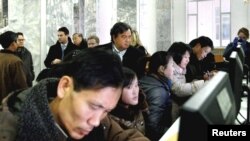A private delegation of Google executives and other U.S. leaders touring North Korea says it is urging Pyongyang to halt its weapons program and allow for expanded use of the Internet and cell phones.
Former New Mexico Governor Bill Richardson, who is leading the delegation, told the Associated Press on Wednesday the group has also been pushing for the fair treatment of a U.S. citizen detained in the reclusive communist country.
"The delegation has had three messages: first, a moratorium on missile launches and no nuclear test. Secondly, the American detainee: treat him properly, give him proper justice. And then third, expand the Internet, expand cell phones," said Richardson.
Richardson, a former U.S. ambassador to the United Nations, and Google executive chairman Eric Schmidt arrived in Pyongyang on Monday for a four-day visit they have described as "humanitarian."
The U.S. State Department has criticized the trip, calling its timing "unhelpful."
The visit follows North Korea's test-launch of a long-range rocket last month - a move denounced by Washington as a threat to regional security and a violation of U.N. Security Council resolutions.
It also comes after North Korea announced the arrest of Korean-American tourist Kenneth Bae, and threatened to put him on trial for unspecified crimes against the state.
On Tuesday, the delegation toured an Internet lab at Pyongyang's Kim Il Sung University, where they were given a rare look at the few people who can access the Internet in the tightly-controlled state.
North Korea's authoritarian government bars the vast majority of citizens from accessing the Internet to shield them from foreign influences. But in recent years, it has permitted some students of elite universities to search the Web under strict conditions and monitoring.
Richardson also met with North Korean foreign ministry officials and described the talks as "good, productive, but frank." He did not elaborate.
Former New Mexico Governor Bill Richardson, who is leading the delegation, told the Associated Press on Wednesday the group has also been pushing for the fair treatment of a U.S. citizen detained in the reclusive communist country.
"The delegation has had three messages: first, a moratorium on missile launches and no nuclear test. Secondly, the American detainee: treat him properly, give him proper justice. And then third, expand the Internet, expand cell phones," said Richardson.
Richardson, a former U.S. ambassador to the United Nations, and Google executive chairman Eric Schmidt arrived in Pyongyang on Monday for a four-day visit they have described as "humanitarian."
The U.S. State Department has criticized the trip, calling its timing "unhelpful."
The visit follows North Korea's test-launch of a long-range rocket last month - a move denounced by Washington as a threat to regional security and a violation of U.N. Security Council resolutions.
It also comes after North Korea announced the arrest of Korean-American tourist Kenneth Bae, and threatened to put him on trial for unspecified crimes against the state.
On Tuesday, the delegation toured an Internet lab at Pyongyang's Kim Il Sung University, where they were given a rare look at the few people who can access the Internet in the tightly-controlled state.
North Korea's authoritarian government bars the vast majority of citizens from accessing the Internet to shield them from foreign influences. But in recent years, it has permitted some students of elite universities to search the Web under strict conditions and monitoring.
Richardson also met with North Korean foreign ministry officials and described the talks as "good, productive, but frank." He did not elaborate.






